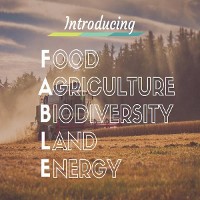06 December 2017 - 08 December 2017
Gallo Rosso, Laxenburg
FOLU-FABLE kick off meeting
On December 6-8 2017, IIASA will host the FOLU-FABLE kick off meeting to discuss how gaps in available geospatial modeling analyses can best be filled in each country; how to make the global FABLE network work; which outputs to prioritize; and how to mobilize the necessary resources.
Food, Agriculture, Biodiversity, Land, and Energy (FABLE) is an initiative to develop consistent global and national pathways towards sustainable land use and food systems by 2050.
The FABLE pathways initiative under the Food and Land-use Coalition (FOLU) aims to address three challenges through a global network of research institutions from the major G20 countries and other countries with large land-use and food sectors:
- No shared global targets and pathways.
- Global targets are not translated to the national level.
- Short-term strategies vs. long-term pathways.
Led by the Sustainable Development Solutions Network (SDSN), the International Institute for Applied Systems Analysis (IIASA), and the EAT Foundation, the initiative will mobilize leading research institutions in each country as well as global knowledge organizations spanning the full FABLE spectrum.
Background
Initiated by IIASA and the UN Sustainable Development Solutions Network (SDSN) and implemented with partners around the world under the umbrella of The World in 2050 Initiative, FABLE aims to address the following challenges:
- At the global level, the lack of a shared understanding of how to meet the integrated objectives of preserving biodiversity, achieving net negative emissions from land use, and producing sufficient nutritious food through sustainable agriculture. Strong global models exist for each of these issues, but they need to be better integrated to ensure consistency with the Sustainable Development Goals and planetary boundaries.
- At the national level, countries lack robust and comprehensive long-term pathways towards sustainable land-use that address food production, greenhouse gas emissions, biodiversity and forest conservation, freshwater availability, and air and water pollution. Most countries, including many highly bio-diverse countries, currently lack adequate analytical modeling tools that are rigorous and integrated across the various knowledge domains (agronomy, hydrology, ecology, climatology, and nutrition).
Without robust long-term pathways, countries are likely to lock themselves into policy dead-ends that will have severe unintended consequences. A central objective is to deliver rapid results that can inform global and national discussions on the implementation of the SDGs and the Paris Climate Agreement.

FOLU-FABLE Meeting Agenda
TWI2050
EVENTS
The Food, Agriculture, Biodiversity, Land, and Energy Project: Pathways for Sustainable Land Use
06 Apr 2017 - 07 Apr 2017
PUBLICATIONS


